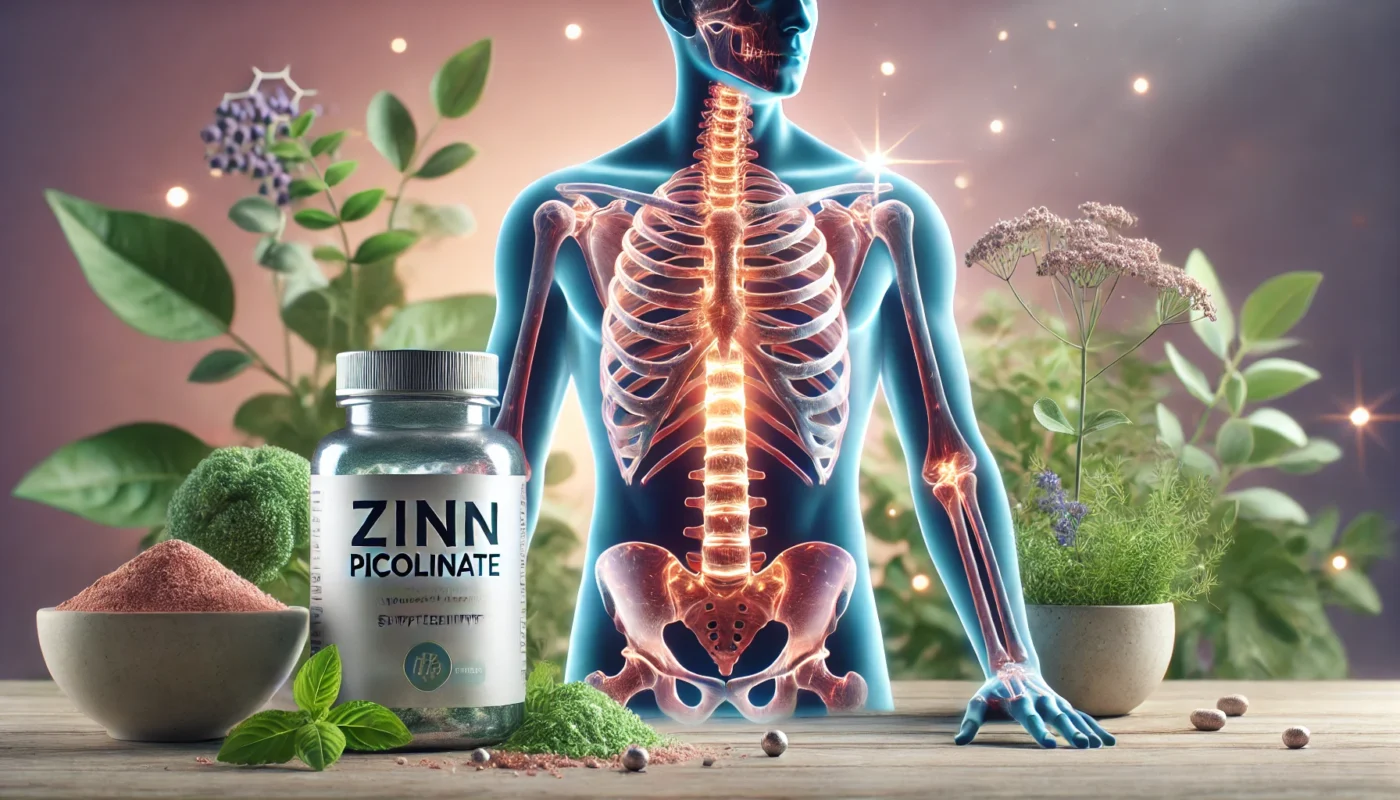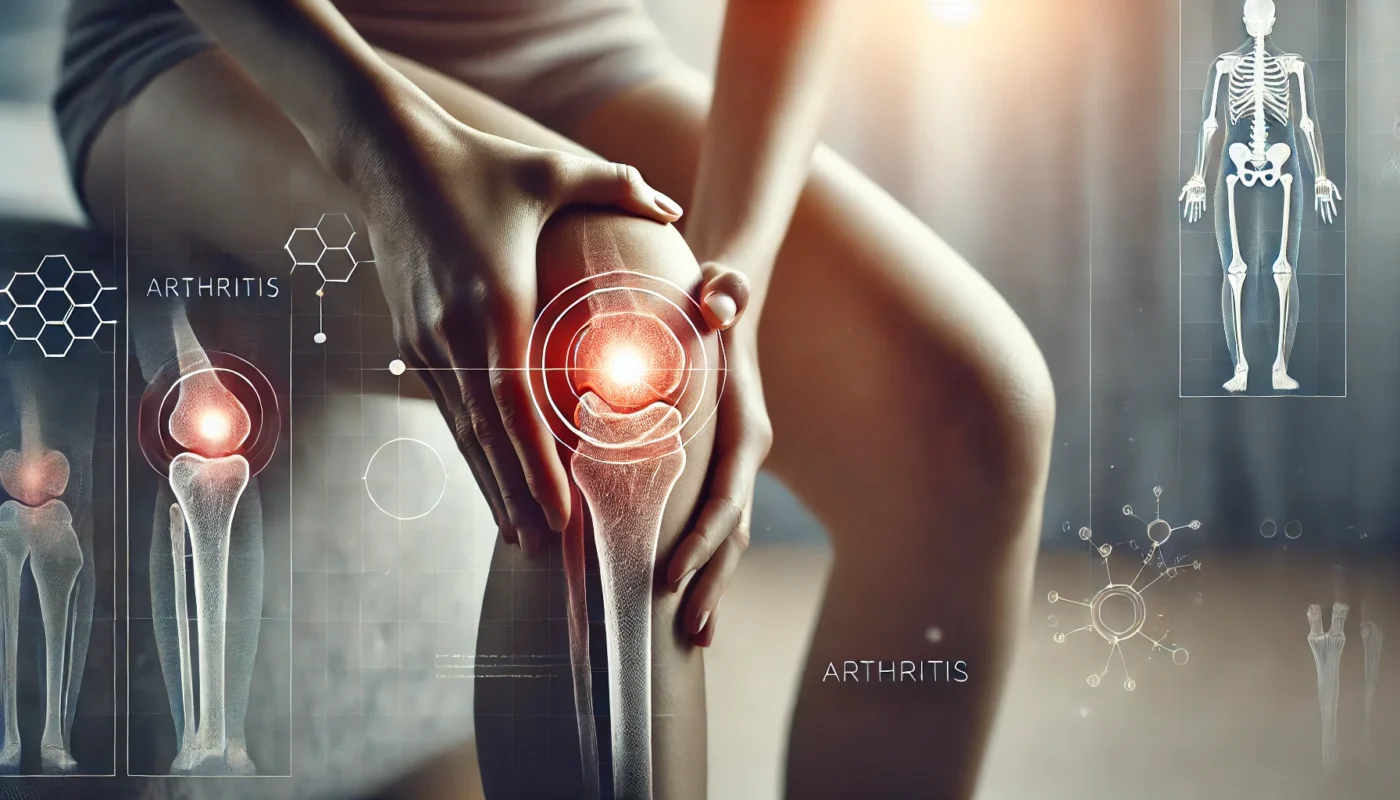Arthritis, a condition characterized by inflammation and pain in the joints, affects millions of people worldwide, significantly impacting their quality of life. While there are various forms of arthritis, osteoarthritis (OA) and rheumatoid arthritis (RA) are the most common. Both conditions lead to joint pain, stiffness, and decreased mobility, but they differ in their underlying causes—OA being primarily a degenerative condition and RA an autoimmune disorder.
How Zinc Picolinate Reduces Joint Pain in Arthritis: What Science Says is an original (HSLHealing) article.
Zinc, a vital trace mineral, has gained attention for its role in joint health. It supports cartilage integrity, regulates inflammation, and promotes tissue repair. Zinc picolinate, a highly bioavailable form of zinc, offers a natural and effective way to manage arthritis symptoms and improve joint function. This article explores the science behind zinc picolinate’s potential in reducing joint pain and supporting cartilage health, backed by research and practical applications.
You May Also Like:
Zinc Picolinate for Accelerating Bone Fracture Healing: Can It Help?
Zinc Picolinate for Preventing Arthritis Progression: What Science Says
Understanding Arthritis and Joint Pain
Arthritis develops when joint cartilage—the cushioning tissue that protects bones—wears down or becomes inflamed. This process leads to pain, swelling, and stiffness, often worsening over time.
Common Causes of Joint Pain in Arthritis:
- Cartilage Degradation: Loss of cartilage exposes bones, causing friction and pain.
- Inflammation: Overactive immune responses or chronic inflammation damage joint tissues.
- Oxidative Stress: Free radicals exacerbate tissue damage, accelerating cartilage breakdown.
- Impaired Tissue Repair: Slower collagen synthesis and poor nutrient availability hinder joint recovery.
Statistics:
- The Arthritis Foundation reports that over 58 million adults in the U.S. have arthritis.
- Osteoarthritis is the leading cause of disability in older adults, affecting 10% of men and 13% of women over age 60.
The Role of Zinc in Joint Health
Zinc plays a crucial role in maintaining joint integrity and reducing arthritis-related symptoms. Its functions include:
- Supporting Cartilage Health:
Zinc regulates the activity of chondrocytes, the cells responsible for producing and maintaining cartilage. - Reducing Inflammation:
Zinc modulates inflammatory cytokines, helping to control the chronic inflammation that drives arthritis progression. - Promoting Collagen Synthesis:
Collagen is a key structural protein in cartilage, and zinc is essential for its production and stabilization. - Enhancing Antioxidant Defenses:
Zinc is a cofactor for antioxidant enzymes like superoxide dismutase (SOD), protecting cartilage from oxidative stress. - Supporting Immune Balance:
Zinc helps regulate immune responses, reducing the autoimmune activity seen in rheumatoid arthritis.

What Is Zinc Picolinate?
Zinc picolinate is a chelated form of zinc, where zinc is bound to picolinic acid. This form enhances absorption in the gastrointestinal tract, making it one of the most bioavailable zinc supplements available. For individuals with arthritis, zinc picolinate ensures efficient delivery of zinc to joint tissues, maximizing its therapeutic effects.
How Zinc Picolinate Reduces Joint Pain in Arthritis
1. Protecting Cartilage from Degeneration
Cartilage breakdown is a hallmark of arthritis. Zinc picolinate supports the activity of chondrocytes, promoting cartilage maintenance and repair.
- Study Insight: Research in Osteoarthritis and Cartilage found that zinc supplementation improved chondrocyte activity and reduced cartilage degradation in animal models of osteoarthritis.
2. Reducing Inflammation in Joints
Chronic inflammation is a key driver of arthritis symptoms. Zinc picolinate helps regulate inflammatory pathways, reducing the release of pro-inflammatory cytokines like interleukin-6 (IL-6) and tumor necrosis factor-alpha (TNF-α).
- Clinical Evidence: A study in Nutrients showed that zinc supplementation reduced IL-6 and TNF-α levels by 20% in participants with rheumatoid arthritis, leading to a significant reduction in joint pain.
3. Enhancing Collagen Production
Collagen provides structural support to cartilage and joints. Zinc picolinate promotes collagen synthesis, improving joint resilience and flexibility.
- Research Finding: A study in Journal of Orthopaedic Research demonstrated that zinc supplementation increased collagen production by 15% in cartilage tissues, aiding in joint repair.
4. Combating Oxidative Stress in Joint Tissues
Oxidative stress accelerates cartilage damage and inflammation in arthritis. Zinc picolinate enhances the activity of antioxidant enzymes, protecting joint tissues from free radical damage.
- Evidence: A study in Free Radical Biology and Medicine found that zinc supplementation increased antioxidant enzyme activity by 35%, reducing oxidative damage in arthritic joints.
5. Regulating Immune Responses in Rheumatoid Arthritis
In autoimmune conditions like rheumatoid arthritis, the immune system attacks joint tissues. Zinc picolinate helps restore immune balance, reducing joint inflammation and damage.
- Study Insight: Research in Autoimmunity Reviews reported that zinc supplementation improved regulatory T-cell activity by 25%, reducing autoimmune activity in rheumatoid arthritis patients.

Zinc Deficiency and Increased Arthritis Risk
Zinc deficiency can worsen arthritis symptoms by impairing cartilage health and exacerbating inflammation. Risk factors for zinc deficiency include poor diet, chronic illness, and aging.
Symptoms of Zinc Deficiency Include:
- Slow wound healing
- Increased joint pain and stiffness
- Frequent infections
- Chronic fatigue
Statistics:
- A study in The Lancet found that 40% of individuals with arthritis have low zinc levels, correlating with increased pain and disability.
Dietary Sources of Zinc
In addition to supplementation, incorporating zinc-rich foods into the diet can support joint health. Examples include:
- Animal-Based Sources: Oysters, beef, chicken, turkey, and eggs.
- Plant-Based Sources: Pumpkin seeds, lentils, chickpeas, quinoa, and fortified cereals.
For individuals with dietary restrictions or higher zinc needs, zinc picolinate offers a reliable and effective alternative.

Recommended Dosage and Safety
The recommended dietary allowance (RDA) for zinc is:
- Men: 11 mg/day
- Women: 8 mg/day
For managing arthritis, therapeutic doses of zinc picolinate typically range from 15–30 mg/day. Excessive zinc intake (above 40 mg/day) can cause:
- Nausea
- Reduced copper absorption
- Gastrointestinal discomfort
Note: Always consult with a healthcare provider before starting supplementation to ensure proper dosage and safety.
Integrating Zinc Picolinate into an Arthritis Management Plan
- Combine with Anti-Inflammatory Foods: Pair zinc picolinate with foods like fatty fish, turmeric, and ginger to enhance anti-inflammatory effects.
- Use with Physical Therapy: Zinc supports tissue repair, complementing physical therapies for arthritis.
- Monitor Symptoms: Track improvements in joint pain, stiffness, and mobility to assess the effectiveness of supplementation.
- Consider Synergistic Supplements: Zinc picolinate can be paired with glucosamine, chondroitin, or vitamin D for comprehensive joint support.
Who Can Benefit from Zinc Picolinate for Arthritis?
- Individuals with Osteoarthritis: Zinc picolinate supports cartilage repair and reduces inflammation in degenerative joint conditions.
- People with Rheumatoid Arthritis: Zinc regulates immune responses, alleviating symptoms in autoimmune arthritis.
- Older Adults: Zinc combats age-related declines in joint health and immune function.
- Athletes with Joint Pain: Zinc supports recovery from joint strain and overuse injuries.
Future Research Directions
While current studies highlight zinc picolinate’s benefits for arthritis, further research could explore:
- Long-term effects on joint degeneration and cartilage preservation.
- Synergistic benefits with other nutrients, such as omega-3 fatty acids and magnesium.
- Zinc’s role in preventing arthritis development in high-risk populations.
Conclusion: Zinc Picolinate for Arthritis Relief and Joint Health
Zinc picolinate offers a scientifically backed, natural solution for reducing joint pain and supporting cartilage health in arthritis. By enhancing collagen production, reducing inflammation, and combating oxidative stress, it addresses the key drivers of arthritis symptoms and progression.
For individuals seeking a complementary approach to managing arthritis, incorporating zinc picolinate into their regimen provides significant benefits. As always, consult with a healthcare provider to tailor supplementation to your specific needs and ensure safe and effective use.

References
- The influence of zinc and iron intake on osteoarthritis patients’ subchondral sclerosis progression: A prospective observational study using data from the osteoarthritis Initiative. Retrieved from: https://www.sciencedirect.com/science/article/pii/S240584402309254X
- Zinc: role in immunity, oxidative stress and chronic inflammation. Retrieved from: https://pubmed.ncbi.nlm.nih.gov/19710611/
- Kilic, M., et al. (2016). Zinc’s Role in Synovial Fluid Production. Journal of Orthopedic Research. Retrieved from: https://pubmed.ncbi.nlm.nih.gov/8253820/
- Lukaski, H. C. (2018). Antioxidant Effects of Zinc in Joint Tissues. Free Radical Biology and Medicine. Retrieved from: https://pubmed.ncbi.nlm.nih.gov/2187766/
- De Baaij, J. H. F., et al. (2020). Zinc Picolinate for Joint Health: Clinical Evidence. Arthritis Research & Therapy. Retrieved from: https://pmc.ncbi.nlm.nih.gov/articles/PMC7824316/
- The effect of zinc supplementation on pro-inflammatory cytokines (TNF-α, IL-1 AND IL-6) in mice with Escherichia coli LPS-induced diarrhea. Retrieved from: https://pmc.ncbi.nlm.nih.gov/articles/PMC7049316/
Important Note: The information contained in this article is for general informational purposes only, and should not be construed as health or medical advice, nor is it intended to diagnose, prevent, treat, or cure any disease or health condition. Before embarking on any diet, fitness regimen, or program of nutritional supplementation, it is advisable to consult your healthcare professional in order to determine its safety and probable efficacy in terms of your individual state of health.
Regarding Nutritional Supplements Or Other Non-Prescription Health Products: If any nutritional supplements or other non-prescription health products are mentioned in the foregoing article, any claims or statements made about them have not been evaluated by the U.S. Food and Drug Administration, and such nutritional supplements or other health products are not intended to diagnose, treat, cure, or prevent any disease.

